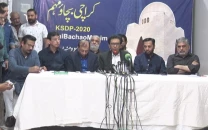Shariat Court takes suo motu over underage girl's marriage
Court says 5-year-old's reported marriage 'un-Islamic'

The Federal Shariat Court (FSC) on Tuesday directed the Balochistan law officer to present the draft bill for the prohibition of child marriage within 20 days after it took suo motu notice over an underage girl's marriage in the province.
It may be noted that Chief Justice Dr Syed Muhammad Anwer had taken notice after media reports had claimed that a five-year old-girl had been forcefully married in the Khuzdar district. The girl's father had also filed a first information report (FIR) of the incident at the local police station.
The CJ observed that the marriage appeared to be both un-Islamic and against the Constitution of Pakistan.
Read Child protection body faces severe funding crunch
"The cruel, un-Islamic and heartless ritual is found in many parts of Pakistan where girls, are given in marriage or servitude to an aggrieved family as compensation to end disputes, often murder," the court stated.
"Under this custom, the personal liberty of a woman is restricted for the rest of her life, against all norms of justice," the FSC said adding that the act of forced marriage was "therefore contravening to the Islamic injunctions and also to Article 9 of the Constitution".
During the proceedings today, all federating units were represented by their respective law officers.
Balochistan's law officer submitted a report to the court stating that the provincial government has drafted a bill titled, “The Balochistan Child Marriages Prohibition Act, 2021”, which will be presented to the Cabinet "as early as possible".
However, the FSC directed the official to submit the draft bill before the court within a period of 20 days.
Read More Child protection cells on the cards
The law officer representing the Khyber-Pakhtunkhwa also sought time to submit a report on the subject matter.
Granting the request, the case was adjourned.
Earlier this year, members of the Balochistan Assembly, representatives of political and social organizations and civil society had called for the constitution of a special committee on ‘child marriage’ for developing a consensus among all stakeholders.



















COMMENTS
Comments are moderated and generally will be posted if they are on-topic and not abusive.
For more information, please see our Comments FAQ